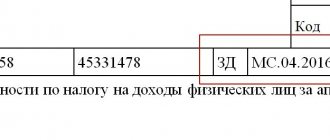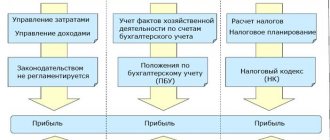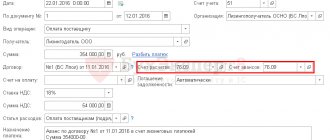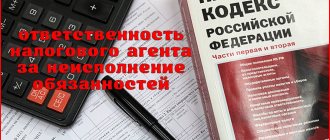Who pays excise taxes
Legal entities, individual entrepreneurs (IP), importers and exporters who carry out transactions subject to excise taxes.
In practice, producers, processors and importers of excisable products act as excise tax payers. Resellers do not pay excise taxes. Please note: organizations and individual entrepreneurs carrying out transactions subject to excise taxes do not have the right to switch to a simplified taxation system and pay a single agricultural tax. As for UTII taxpayers, they are not exempt from excise taxes and are charged the same as companies and entrepreneurs under the general taxation system.
Fill out a payment form for free in the service, where the current KBK and other details are entered automatically
Who will be the excise tax payer if the goods are sold by an intermediary?
When selling excisable goods, excise tax payers are almost always manufacturers.
The exception is the sale of confiscated, ownerless and abandoned valuables. Therefore, even when concluding an intermediary agreement, the manufacturer must pay excise tax. Moreover, the peculiarity of taxation here is that the excise tax must be charged at the time of transfer of excisable products to the intermediary, without waiting for the sale of goods to the final buyer. This is explained by the provisions of paragraph 2 of Art. 195 of the Tax Code of the Russian Federation, which defines the date of sale of excisable goods as the day of their shipment or transfer. Therefore, despite the retention of ownership of excisable goods by the manufacturer, the tax must be calculated immediately upon transferring them to the intermediary. This is what the Russian Ministry of Finance thinks (see letter dated October 1, 2008 No. 03-07-06/87). You can find more complete information on the topic in ConsultantPlus. Full and free access to the system for 2 days.
What goods are excisable?
Ethyl alcohol and products that contain more than 9% of such alcohol. The exception is medicines, as well as veterinary drugs in containers of no more than 100 ml. Another exception is perfumes and cosmetics with a share of ethyl alcohol up to 80% inclusive (with a spray bottle - up to 90% inclusive), bottled in bottles up to 100 ml, as well as perfumes and cosmetics with a share of ethyl alcohol up to 90% inclusive, bottled in containers up to 3 ml. inclusive.
In addition, alcohol products, beer, tobacco products (including those intended for consumption by heating), cars and motorcycles with an engine power exceeding 112.5 kW (150 hp), diesel fuel, motor oils, automobile and straight-run gasoline, benzene, paraxylene, orthoxyl, aviation kerosene, natural gas, as well as electronic nicotine delivery systems and liquids for them.
When are excise taxes charged?
When importing excisable goods, as well as when selling and transferring excisable goods produced on the territory of the Russian Federation.
The sale of excisable goods is a transfer of ownership on a paid or gratuitous basis, including the use of excisable products for payment in kind. In this case, excise taxes are charged only in the case when ownership passes directly from the manufacturer of excisable goods (for example, from the manufacturer to the wholesaler). For further resale (for example, when shipped from a wholesaler to a retail chain), excise taxes are not required.
Also, excise taxes must be paid on the sale of confiscated and ownerless excisable goods, including excisable goods received by court decision.
The transfer of excisable goods is an operation in which there is no transfer of ownership. In this case, excise taxes are charged only if excisable goods are transferred directly by their manufacturer. If the product is transferred by the person who bought it in finished form, there is no need to charge excise taxes.
Thus, excise taxes are imposed on the transfer of manufactured products for processing on a toll basis and the shipment of excisable goods made from toll raw materials. In addition, excise taxes are charged upon the transfer of manufactured goods for one’s own needs, to the authorized capital or to the founder upon the latter’s disposal.
In general, excise taxes cover the movement of products within a company for the further production of non-excisable goods, and since 2011 - the “internal” transfer of ethyl and cognac alcohol for the production of alcohol or other excisable products. The internal movement of created excisable goods to the unit involved in their retail sale is also subject to excise taxes.
Finally, excise taxes are charged when denatured ethyl alcohol and straight-run gasoline are obtained by organizations that have the appropriate certificates.
Excise taxes on petroleum products
Who pays excise taxes Excise taxes are indirect taxes included in the price of goods and paid by the buyer. Currently, the procedure for taxation of excise taxes is regulated by the Tax Code of the Russian Federation (Part II Chapter 22). Payers of excise taxes are organizations and individual entrepreneurs - Article 179 of the Tax Code of the Russian Federation. Also, in accordance with the Customs Code of the Russian Federation, excise taxes are also paid by those who move goods across the border. The list of excisable goods is quite large; its full list is given in Article 181 of the Tax Code of the Russian Federation. As for petroleum products, excise taxes are levied on motor gasoline, diesel fuel, motor oils for diesel and carburetor engines, as well as straight-run gasoline. Obtaining certificates One of the first tasks of organizations involved in the production of straight-run gasoline and petrochemical products is obtaining a certificate. This document must indicate its number and date, the name of the issuing tax office, as well as the name of the organization that received the certificate. The certificate contains not only the taxpayer’s INN, but also the type of his activity, as well as details of documents on ownership of production facilities and details of the contract for the provision of petroleum products processing services by the enterprise. The certificate is issued within 30 days from the date of submission of the relevant application and necessary documents. However, in some cases, tax authorities may suspend the validity of the issued certificate. In this case, the organization must be given six months to eliminate violations. And if the errors are not corrected, then the document will be cancelled. So, the validity of a certificate can be suspended in cases where: – the company has violated the procedure for calculating and paying excise taxes; – the enterprise receiving gasoline did not submit a register of invoices within three tax periods (Article 201 of the Tax Code of the Russian Federation); – the organization worked on equipment without the use of control devices and special measuring equipment. The certificate can be canceled: – at the initiative of the company on the basis of a corresponding application; – when transferring the certificate to another person; – during the reorganization of the enterprise; – when changing the name or location of the enterprise; – due to termination of ownership of the production facilities indicated in the certificate. Let us note that only those companies that have a certificate for processing straight-run gasoline have the right to deduct the excise tax accrued when receiving straight-run gasoline for the purpose of producing petrochemical products (Clause 15, Article 200 of the Tax Code of the Russian Federation). But even if the certificate is cancelled, you can deduct the excise tax accrued upon receipt of straight-run gasoline for the purpose of producing petrochemical products. This was stated in the letter of the Ministry of Finance of Russia dated August 3, 2010 No. 03-07-06/153. Officials remind that in order to obtain the right to deduction, an enterprise must submit to the inspection documents confirming the use of the resulting fuel for the production of petrochemical products. Such as: – invoice for internal movement; – invoice for the release of materials to the third party; – limit-fence card; – act of acceptance and transfer of raw materials for processing between structural divisions; – act of writing off raw materials for production. We pay excise taxes The objects of taxation are the sale of excisable goods on the territory of Russia, their transfer within the structure of the organization for further production, transfer to persons for their own needs, to the authorized capital, to a participant in a partnership upon its disposal, as well as the import of excisable products into the territory of Russia. Please note that the transfer of goods to structural units that are not independent taxpayers is exempt from taxation. Also, the initial sale of confiscated or ownerless excisable goods, which were abandoned in favor of the state, is not taxed. Excise rates Each type of excisable goods has its own excise rate. For the period from July 1 to December 31, 2013 inclusive, the excise tax rate on motor gasoline is: - not corresponding to class 3, or class 4, or class 5 - 10,100 rubles. for 1 ton; – class 3 – 9750 rub. for 1 ton; – class 4 – 8560 rub. for 1 ton; – class 5 – 5143 rub. for 1 ton. Excise tax rate on diesel fuel: – not corresponding to class 3, or class 4, or class 5, – 5860 rubles. for 1 ton; – class 3 – 5860 rub. for 1 ton; – class 4 – 4934 rub. for 1 ton; – class 5 – 4934 rub. for 1 ton. The excise tax rate on motor oils for diesel and carburetor engines is RUB 7,509. for 1 ton, for straight-run gasoline - 9617 rubles. for 1 ton. Mixing of products If, on the basis of a certificate, an enterprise has produced class 4 gasoline for its own needs by mixing straight-run gasoline with a high-octane additive, then there is no need to pay excise tax. This point of view was expressed by the Russian Ministry of Finance in letter dated December 4, 2008 No. 03-07-06/106. In accordance with subparagraph 9 of paragraph 1 of Article 182 of the Tax Code of the Russian Federation, operations for the transfer of motor gasoline for one’s own needs are recognized as subject to excise taxes only if the organization is a manufacturer of this gasoline. In this case, the mixing process is equated to production, but only if the final product is excisable and taxed at a higher rate (clause 3 of Article 182 of the Tax Code of the Russian Federation). So if a company produced gasoline with a lower excise tax rate, it does not need to be subject to excise taxes. Determining the moment of sale According to paragraph 2 of Article 195 of the Tax Code of the Russian Federation, in a standard situation, excise tax is charged on the day of shipment (transfer) of the goods to the buyer (letter of the Ministry of Finance of Russia dated January 14, 2010 No. 03-07-06/03). If retail sales are carried out, then the date of sale will be considered the date of transfer of petroleum products to the trading unit. Also take into account the nuances when selling goods through an intermediary. The fact is that the sale of goods is recognized as the transfer of ownership of it from one person to another on a compensated and gratuitous basis. At the same time, for excise tax purposes, the date of sale is considered to be the date of their shipment in accordance with paragraph 2 of Article 195 of the Tax Code of the Russian Federation. So, in the case of selling products through an intermediary, the moment of transfer of ownership does not matter. And it is necessary to charge excise duty precisely at the time of shipment (letter of the Ministry of Finance of Russia dated January 14, 2010 No. 03-07-06/03). Filing a declaration The Tax Code of the Russian Federation obliges enterprises to file a declaration for the tax period before the 25th day of the month following the reporting month. Those companies that have a certificate for operations with straight-run gasoline submit reports once every three months no later than the 25th day of the third month following the reporting month. When filling out the declaration, it is necessary to take into account the recommendations of officials given in the letter of the Federal Tax Service of Russia dated February 1, 2012 No. ED-4-3 / [email protected] As is known, since the beginning of this year, excise tax rates on motor gasoline and diesel fuel, and their taxation, have changed depends on the product class. In this case, the excise tax declaration must be submitted in the form approved by the order of the Federal Tax Service of Russia dated June 14, 2011 No. ММВ-7-3/ [email protected] And for now the following codes must be reflected in the document: – class 4 motor gasoline – code 664 ; – motor gasoline class 5 – code 665; – diesel fuel class 4 – code 634; – diesel fuel class 5 – code 635. Important to remember In a standard situation, excise tax is charged on the day of shipment (transfer) of the goods to the buyer. In this case, the tax rate depends on the type of excisable goods. Real schemes Let's consider some of the possible chains of fuel resale, consisting of the following participants: a plant, an oil depot, a wholesaler, etc., a gas station, from the point of view of forming the price of fuel for the end consumer only due to the inclusion of excise taxes in it (excluding other taxes and trade margins). 1. None of the participants in the chain have Certificates. The plant will pay the excise tax to the budget and, upon further sales, will include the amount of the paid excise tax in the cost of the fuel sold. Further down the chain there is no obligation to pay excise tax to the budget. The cost of fuel for the end consumer will include 1 excise tax. 2. All participants have Certificates. All participants are excise tax payers, but everyone except gas stations have the right to a deduction. If the right to deduction is exercised, then only the gas station will pay the excise tax to the budget and then include the amount of the paid excise tax in the cost of fuel for the end consumer. Thus, the cost of fuel for the end consumer (which already includes 1 excise tax paid by the plant) will include 1 excise tax. 3. The plant does not have a Certificate, but all other participants do. The plant will pay the excise tax to the budget and include it in the cost of fuel upon sale. The rest of the chain participants, except gas stations, exercise the right to deduct. The gas station will pay its excise tax to the budget and include the amount of excise tax paid in the cost of fuel for the end consumer. The cost of fuel for the end consumer will include 2 excise taxes. 4. The plant does not have a Certificate, and then there is a mixed chain (some of the participants have a Certificate, some do not). The plant will pay the excise tax to the budget and include it in the cost of fuel upon sale. Further along the chain, as many excise taxes will be paid to the budget as the number of times the fuel reaches a participant with a Certificate, which upon further sale does not have the right to a deduction (either at a gas station, which in principle does not have the right to a deduction, or upon further sale of fuel to a participant without a Certificate) . The number of excise taxes included in the cost of fuel for the end consumer is equal to: the number of receipts of fuel by a participant with a Certificate without the right to deduction plus 1. 5. If the plant has a Certificate, and then a mixed chain, then the number of excise taxes included in the cost of fuel for the end consumer , is equal to: the number of fuel receipts by a participant with a Certificate without the right to deduction. 6. A special case for the last two options: the gas station has a Certificate and, by law, has no right to a deduction. Retailers (gas stations) must understand that mixed chains, in which the gas station has a Certificate, will receive an extra excise tax in the cost of fuel for the end consumer compared to mixed chains, at the end of which there is a gas station without a Certificate, since no matter what the price of the gas station receives fuel (i.e. how much excise tax is included in the price), if the gas station has a Certificate, it is forced to include in the price of fuel for the end consumer one more excise tax (paid by it) in addition to all the previous ones. The only exception is the case when the direct supplier of the gas station also has a Certificate.
When excise taxes are not charged
When moving excisable goods within the manufacturing company, if the purpose of the movement is the production of other excisable goods. There is an exception here: the transfer of alcohol for the production of alcohol and other alcohol-containing excisable products is not exempt from excise taxes.
In addition, excise taxes are not charged to exporters who have provided certain documents to the tax office.
To obtain an exemption on any of the above grounds, it is necessary to keep separate records of transactions subject to and not subject to excise duties.
The issue of increasing budget allocations from excise taxes on petroleum products will be considered in January 2020
The issue of repairing regional roads and supporting constituent entities will be seriously considered at the federal level - in the government of the country, as well as the Russian Ministry of Transport. Without support from the federal treasury, it will be extremely difficult for the regions in this regard, noted the Chairman of the Duma Committee on Transport and Construction, Evgeny Moskvichev, answering questions from journalists on September 5 after a meeting in the regional government.
In January 2018, the issue of increasing budget allocations from excise taxes on petroleum products will be considered in detail by the government of the country, said E. Moskvichev. This will help bring the road network towards Naryan-Mar back to normal condition much faster.
“Next we will look at roads where there is a lot of traffic and allocate money for them too,” he noted. “We believe that approximately 88% of excise taxes from the federal budget should go to the region.”
In addition, E. Moskvichev emphasized that the leadership of Komi is building a correct and competent policy in the field of passenger transportation. “We believe that the republic needs to be supported in this regard,” he said.
The head of Komi, Sergei Gaplikov, in turn, explained his position on the issue of road concessions.
“It is clear that we are talking about “remote” means. The region will still pay them. But with what load, at what time and how well the work will be done, here, of course, there is mutual responsibility. In this part, we do not absolve ourselves of responsibility, and if the aspects of the agreement are further settled, this practice must be applied in territories such as Komi,” the head of Komi believes.
According to the head of the region, this will really improve the state of transport infrastructure in Russian regions.
Russian State Duma Deputy Olga Savastyanova added to the above that the very visit of the Chairman of the Duma Transport Committee is due to the fact that there are problems in Komi. which today cannot be solved without federal support.
“Everything that is adopted today at the federal level is common to all entities. But there is one “but”: you and I have a special republic. It is very large, with low fees. And we cannot fit into some standards. Therefore, one of the main tasks is that when decisions are made, the characteristics of a particular subject must be taken into account. We want to achieve this and we have to work in this direction,” concluded O. Savastyanova.
Excise rates
There are three types of excise tax rates: specific, ad valorem and combined.
Specific (solid) represent a fixed amount per unit of measurement. It is the specific rates that are approved for all excisable goods except cigarettes and cigarettes. For example, for sparkling (champagne) wines in 2020, the rate is 40 rubles. for one liter.
Ad valorem rates are set as a percentage of the cost of the goods. Currently this type of bet is not used.
Combined (mixed) rates have two components: specific and advolar. Mixed rates are approved for cigarettes and cigarettes. In particular, for cigarettes in 2020, the excise tax is calculated at a rate of 1,966 rubles. for one thousand pieces plus 14.5% of the estimated cost* (but not less than RUB 2,671 per thousand pieces).
Excise tax rates are revised annually. Rates have now been set for 2020, 2021 and 2022.
Excise tax on gasoline: rates in 2020
Excise tax rates on gasoline for 2020 are set by Art. 193 Tax Code of the Russian Federation. They differ depending on the class of gasoline:
- Straight-run gasoline and motor gasoline that does not correspond to class 5—RUB 13,100. for 1 t;
- gasoline class 5 - 11,213 rubles. for 1 ton (from 01/01/2018 to 06/30/2018) and 11,892 rubles. per ton (from 07/01/2018 to 12/31/2018).
In 2020, compared to 2020, the tax rates on straight-run and motor gasoline that do not correspond to class 5 did not change, and for class 5 gasoline, excise tax rates were increased, twice - from 01/01/2018 and from 07/01/2018 . In the next two years, an increase in excise tax rates for class 5 gasoline is also envisaged: RUB 12,314. per ton in 2020 and 12,752 rubles. per ton in 2020.
Read about excise tax rates in 2020 in the material “What excise tax rates are set for 2018?”
How to calculate excise taxes
It is necessary to determine the tax base and multiply it by the excise tax rate. The base is calculated separately for each type of excisable goods and depends on the rate established for it. In the case of a fixed rate, the base is the volume of production in physical terms (for example, 1,000 liters of sparkling wines). For combined rates, the base is the volume in physical terms plus the estimated value (for example, 100,000 cigarettes plus their cost equal to 690,000 rubles). If the taxpayer does not keep separate records of transactions subject to different rates, then he must determine a single base and apply the highest of the rates to it.
The base is calculated based on the results of the tax period, which is equal to one calendar month. It may happen that the base determined by producers, processors and importers of alcoholic and alcohol-containing products is less than the volume reflected by them in the Unified State Automated Information System (EGAIS). In such a situation, excise taxes must be calculated based on the data of this system.
The taxpayer presents the excise tax amount to the buyer (except for transactions with straight-run gasoline and denatured ethyl alcohol), and in the manufacture of excisable goods from customer-supplied raw materials - to the owner of such raw materials. In other words, the buyer or seller must pay not only the cost of the product and the amount of VAT, but also excise taxes. Their value is generally highlighted as a separate line in primary and settlement documents, as well as in invoices. If the excise tax payer carries out transactions exempt from this tax, the inscription “without excise tax” must be written on the “primary” and invoices. During retail sales, excise taxes are included in the price of the product, but are not highlighted on labels, price tags and receipts.
Organizations that have assessed and presented excise taxes to the buyer can include them as expenses, and entrepreneurs can include them in professional deductions.
Get a sample accounting policy and do accounting in a web service for small LLCs and individual entrepreneurs Get it for free
How to take into account input excise taxes
If the buyer does not use the purchased excisable goods for the production of other excisable products, then the excise taxes transferred to the supplier or paid at customs must be included in the cost of the goods.
If the buyer sends the purchased excisable products for the production of other excisable products and includes them in expenses (professional deductions), then input excise taxes should be deducted**. The same rule applies to dealers and manufacturers. A deduction is not always possible, but only in a situation where the excise tax rate on goods sent for production and the rate on manufactured products are determined based on the same unit of measurement of the tax base.
A deduction means that when paying tax, an organization or individual entrepreneur can reduce the amount of accrued excise taxes by the amount of input excise taxes.
An important rule applies here: excise taxes can be deducted only after they have actually been paid. The right to deduction should be confirmed by primary documents for the transaction, incoming invoices (for imports - cargo customs declarations) and papers confirming the transfer of excise duty to the seller.
If at the end of the month the amount of the deduction exceeded the amount of accrued excise taxes, the difference can be offset against future payments or returned from the budget.
General concept of excise tax
Excise tax is one of the types of indirect taxes applied to consumer goods, which is included in the price of the product. An excise tax is usually established on highly profitable goods in order to regulate demand for them.
Gasoline belongs to the group of highly profitable goods and is excisable. Excise taxes on it are one of the sources of generating state budget revenues.
For other types of excisable goods, read the material “What are excisable goods - list 2018?”
When to transfer excise taxes to the budget
For operations on the sale and transfer of excisable goods, the last date for payment of excise taxes is the 25th of the next month. For operations with straight-run gasoline and denatured alcohol - the 25th day of the third month following the expired tax period.
Russian alcohol producers must make advance payments on excise taxes no later than the 15th day of the current tax period. Subsequently, the advance payment can be deducted. Exemption from advance payments is provided for those who submit a bank guarantee to the tax office, according to which the bank undertakes to transfer excise taxes instead of the taxpayer in case of non-payment.
Automate alcohol accounting and preparation of alcohol reporting Try for free
Changes in excise taxes 2018
The legislation has introduced a number of clarifications and changes in the rates of some excisable goods. Let's take a closer look at them.
Expanded list of excise-free transactions
Two new subclauses were added to Article 183 of the Tax Code of the Russian Federation, which contains a list of transactions for which excise duty is not provided: 4.1 and 4.2. According to them, from January 2020, in addition to the previously regulated ones, the following operations become non-excise:
- sale of excise goods subject to re-export;
- transfer to the owner or those to whom he indicates, excisable goods that were manufactured according to a toll-to-pay scheme, for the purpose of sale abroad under the re-export procedure.
Changes in excise taxes on distillates
The above law clarified the parameters and operations with such excisable goods as middle distillates . According to subclause 1 of clause 1 of Art. 181 of the new edition of the Tax Code of the Russian Federation, they are liquid mixtures of oil and gas processing products. The law specifies the physical and chemical parameters of such distillates:
- the condition of the product is assessed at a temperature of 20ºС and standard atmospheric pressure of 760 mm Hg. Art.;
- the product can be primary or secondary processed;
- excisable hydrocarbons can be produced from oil, gas condensate, oil shale, and associated petroleum gas;
- The density of the products under the specified conditions should not exceed 930 kg/m3.
operations with middle distillates are subject to excise tax :
- receiving;
- purchase of property;
- arrival after processing of raw materials, which were the property of the organization.
The Tax Code clearly outlines the methods for calculating excise duties on this type of goods, as well as the nuances of using the right to a tax deduction for such transactions. In this regard, paragraph 2 of Art. 195, paragraph 4, art. 199, paragraph 2 of Art. 200 of the Tax Code of the Russian Federation, and new clauses were added - clause 25 and clause 26 of Art. 201 Tax Code of the Russian Federation.
Innovation of evidence
Those entrepreneurs who process middle distillates will have to pay a fee to obtain a registration certificate. This, according to legislators, should help control the accrual and payment of excise taxes. Art. 179.6, new to the Tax Code of the Russian Federation, talks about the rules by which such certificates will be issued.
Art. slightly amended. 179.3 of the Tax Code of the Russian Federation in terms of clause 1. It regulates the rules for issuing certificates for operations with straight-run gasoline - now they are written out in more detail.
Raising excise rates
An important change affected not only the size of bets. Now the law allows them to be installed only for 6 months, the “border” passes on July 1.
Clause 1 Art. 193 of the Tax Code of the Russian Federation increases excise rates on a number of consumer goods, namely:
- tobacco products;
- liquids containing nicotine;
- e-Sigs;
- Cars;
- gasoline and diesel fuel;
- middle distillates;
- alcoholic goods;
- ethanol.
The new bet sizes are shown in the table.
ATTENTION! For cars, not only the rates themselves have changed, but they have been divided into several groups depending on the power of the car’s engine.
How to report excise taxes
At the end of each month, taxpayers are required to submit an excise tax return to the tax office where the parent organization and each of its divisions are registered. The deadline for submitting the declaration is the 25th day of the month following the expired tax period.
For organizations that have certificates for operations with denatured alcohol and straight-run gasoline, a special procedure has been approved - they must submit declarations no later than the 25th day of the third month following the tax period.
Taxpayers obligated to make advance payments must, no later than the 18th day of the current month, submit to the tax office a copy of the payment order for the transfer of advance payments, a copy of the bank statement about debiting money from the account and a notice indicating detailed information about the transactions subject to excise duty.
Excise taxes on exports
Exporters are required to confirm their eligibility for excise duty exemption. To do this, they must present to the tax office a list of documents related to the foreign trade transaction (contract, cargo customs declaration, bank statement on receipt of export proceeds, etc.). The papers must be submitted no later than 180 calendar days from the date of sale of excisable products. If 180 days have expired and the package of documents has not been collected, the taxpayer is obliged to charge and pay excise taxes.
In addition, the exporter is required to present a bank guarantee to the tax office. This document guarantees that if the taxpayer does not collect all the required documents for the transaction within 180 days, the bank will transfer excise taxes and penalties for it. In the absence of a guarantee, the exporter is obliged to pay excise taxes on his own, but after the timely provision of a package of papers, excise taxes can be reimbursed from the budget.
* The estimated cost depends on the maximum retail price, which is the cost of a pack of cigarettes and cigarettes, which neither shops nor catering establishments are allowed to exceed. This price must be set by the manufacturer, he is also obliged to indicate it on the packaging and report it to the tax office.
** The exception is operations with straight-run gasoline and denatured alcohol, for which a special procedure for accepting deductions applies.










